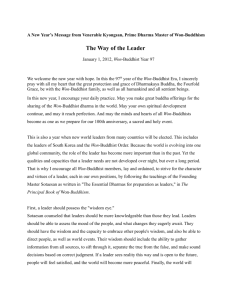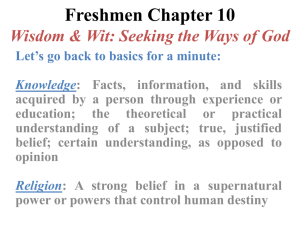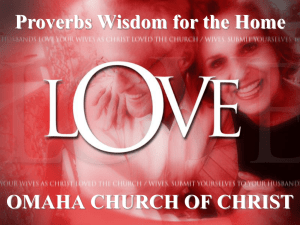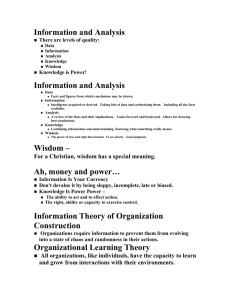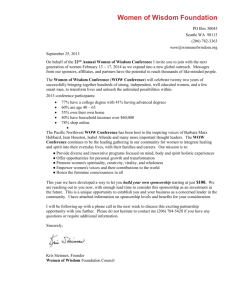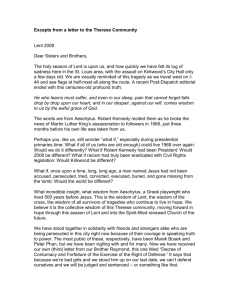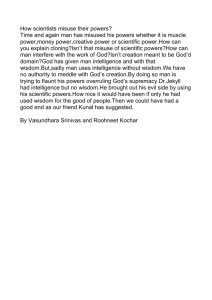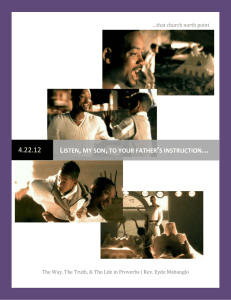Freshmen Chapter 10 Wisdom & Wit: Seeking the Ways of God
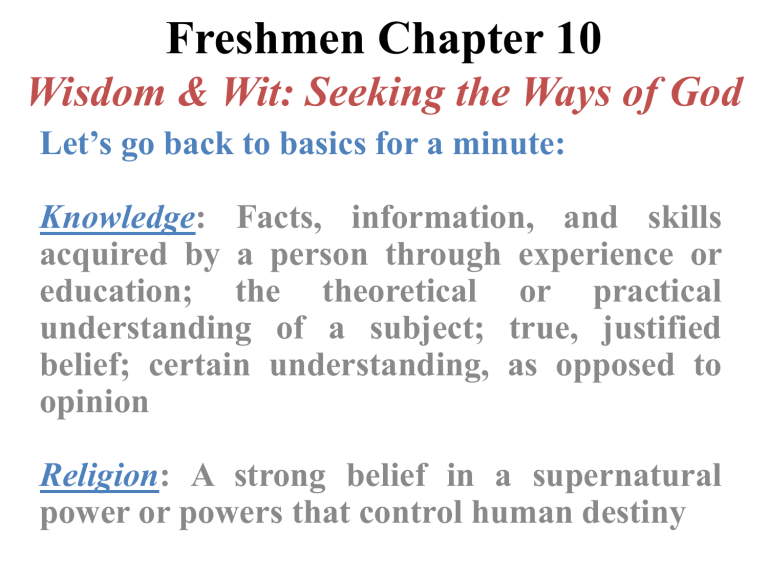
Freshmen Chapter 10
Wisdom & Wit: Seeking the Ways of God
Let’s go back to basics for a minute:
Knowledge : Facts, information, and skills acquired by a person through experience or education; the theoretical or practical understanding of a subject; true, justified belief; certain understanding, as opposed to opinion
Religion : A strong belief in a supernatural power or powers that control human destiny
•
A synonym for failure is fiasco : A thing that is a complete failure, esp. in a ludicrous or humiliating way
•
Success : A person or thing that achieves desired aims or attains prosperity
Which do you want to be?
•
Now we turn to a variety of Old Testament texts written at various times after the Babylonian exile
•
The authors of these books tried to answer these questions:
What does it mean to be a wise person?
What is the meaning and purpose of life?
Where are we going?
Why do good people suffer and bad people prosper?
Why should we be good in a world that is unfair?
How can we live good and faithful lives when surrounded by those who are hostile to our beliefs?
•
The Book of Proverbs appeared sometime after the Babylonian exile during the period when the second, primitive temple was being built in Jerusalem
•
It contains collections of wisdom teachings oriented toward teaching the young
•
Parts of The Book may date back to the time of King Solomon
•
It is concerned with how to live a good life
•
It is full of down-to-earth, practical advice
•
How to live a good life according to The Book of
Proverbs : (See pg 246 ff) – Discuss one @ a time
Parenting
Communicating
Attitudes
Manners at court
Work
Conducting Business
Reputation
Leadership
Gossip
Learning
Relationships with neighbors
•
Notice the literary device used in wisdom sayings: the same thing is said twice in two different ways, ex “Misfortune pursues sinners, / but prosperity rewards the righteous”
•
The teachers says the first part of the saying and the students respond with the second part
•
In the original Hebrew it would have been even more fun with the clever word plays and sounds unique to the Hebrew language
•
According to The Book of Proverbs, success & prosperity in this life , gained fairly, are the reward for a virtuous life
Watch video “The Book of Proverbs”
•
Notice the focus in Judaism on rewards for being good come in this life not in the afterlife as in
Christianity
•
Honor, dignity, and a good name are a person’s memorial – there is no hint of an afterlife in
Jewish theology
•
If pressed, Rabbis talk about a “collective” afterlife with God in heaven but there is no notion of an individual afterlife with God
•
Where is God in all this wisdom? – most of the sayings do not mention God
•
The perspective of the Jewish sages (“ sage ” means a
“ wise teacher ”) was that true wisdom is from God, no matter where we find it – even in other cultures with their appealing wisdom sayings
•
The sages saw the world as full of God’s wisdom so it is not surprising that the sages looked to the everyday experiences of the world to find wisdom
•
The Book of Proverbs often portrays the image of
God’s wisdom as a
woman
and adds a feminine voice and quality to the traditional image of God as masculine and this feminine image of wisdom has been called “ Lady Sophia ” after the Greek word for wisdom
•
God is pure spirit – neither man nor woman
•
God is personal, but transcends the human categories of gender
•
The Old Testament writes used the terms
“male” and “female” because that’s that they knew from their everyday experience
•
Catholic tradition has often read the passages on Wisdom in the Old Testament as related to
Mary, the mother of God.
•
Mary is called the “ Seat of Wisdom
” in some prayers in the Catholic liturgy
STOP



